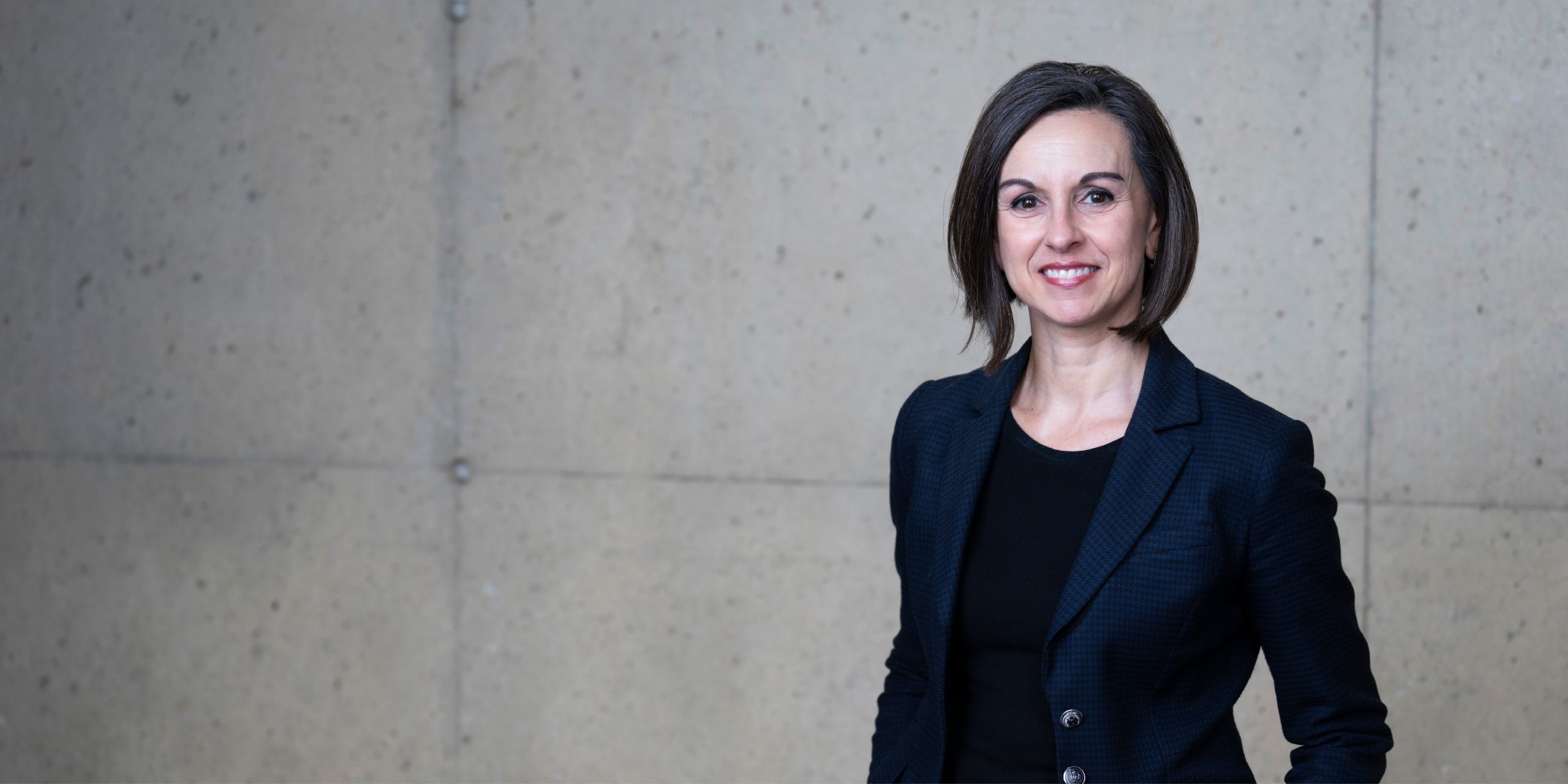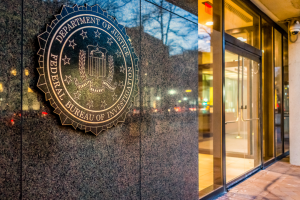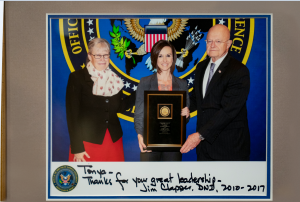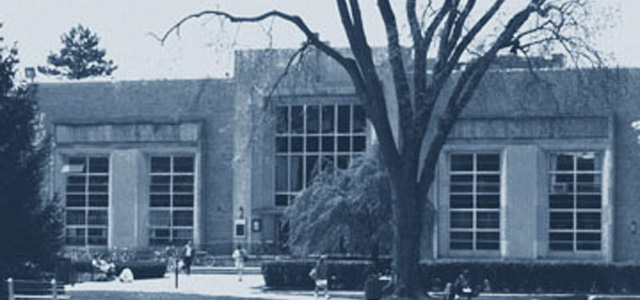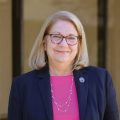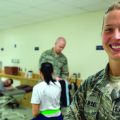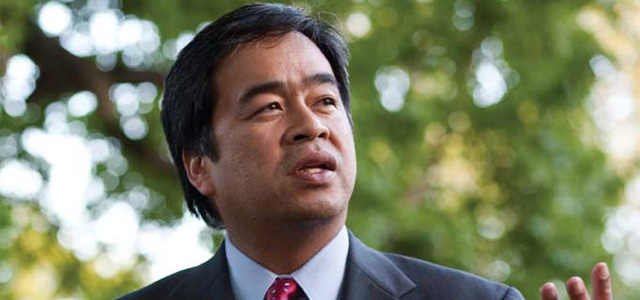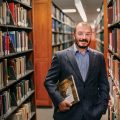By Christopher Hann
Tonya Ugoretz, M.A. ’01 was just 18 months into her career at the Federal Bureau of Investigation — 18 months removed from graduating with the first full class at Seton Hall’s School of Diplomacy and International Relations — when in 2003 she was chosen to serve as the daily intelligence briefer for FBI Director Robert Mueller.
With the nation at war in the Middle East, the gravity of the assignment could not be overstated: Ugoretz would meet with the director before 7 a.m. each day to update him on the panoply of threats — terroristic, technological and otherwise — posed to the United States from across the nation and around the world. The director would take that information to his daily morning briefing with the president.
The FBI is a famously agent-driven agency, yet Ugoretz was an intelligence analyst at the bureau, not an agent. (“I don’t carry a gun,” she assures.) So it’s worth noting she was the first non-agent to be chosen as the director’s daily briefer. And it’s fair to say she felt some pressure. “If you screw this up,” she remembers thinking to herself, “you’ll also be the last analyst to serve as the director’s briefer.”
She needn’t have worried. In a decorated FBI career now in its 23rd year, Ugoretz has served in one high-pressure position after another, some in collaboration with other federal agencies, including a tour of duty in the CIA’s Counterterrorism Center.
Today she’s the assistant director of the FBI’s Directorate of Intelligence. “My work has been focused on analyzing intelligence that helps us identify threats, both domestic and international,” Ugoretz says. “All of our adversaries are trying to leverage the latest technology in order to achieve their directives. Our goal is to stay a step ahead of them.”
Upon graduating from Seton Hall, Ugoretz was selected as a presidential management fellow in a prestigious program that prepares advanced degree holders across academic disciplines for leadership careers in the federal government. She figured she might be destined for the State Department.
But the FBI came calling. Ugoretz was offered a position as an intelligence research specialist in the bureau’s Investigative Services Division. She knew little about the FBI other than what she’d seen in the movies but thought the two-year assignment would at least be a foot in the door.
And then, on September 11, 2001, while Ugoretz was awaiting the completion of her FBI background check, 19 members of Al Qaeda hijacked four American jetliners, crashing two of them into the World Trade Center in New York City, one into the Pentagon in Washington, D.C., and another into a field in rural Pennsylvania. “Immediately,” Ugoretz says, “what I was going to be doing with the FBI had a lot more relevance.”
Ugoretz made an immediate impact. A year after starting at the bureau, she moved to the Counterterrorism Division as an intelligence analyst.
A year later, she became the director’s daily briefer. She would start work each day around midnight, poring over stacks of reports gathered by the agency’s 56 field offices across the United States and elsewhere across the globe.
She had no more than 15 minutes with the director each morning, so she knew her presentation had to be both precise and concise. The director’s conference room contained a single long table, with a door at one end. Ugoretz had to walk the length of the table to reach her seat. Many were the mornings when Mueller would ask Ugoretz, “What have you got?” before she even sat down.
It was in preparing for these daily briefings — as fleeting as they were critical to the nation’s security — that Ugoretz would recall the advice she had once received from Courtney Smith, today the dean of Seton Hall’s School of Diplomacy and International Relations. Smith had been one of her professors during her first semester of graduate school, and she remembered him imploring students, in their writings, to get to the heart of the matter with all due haste. “Your papers are not a murder mystery,” she recalled Smith counseling. “Don’t wait until the end to tell me your point.” In preparing her morning briefings for Mueller, Ugoretz applied that lesson on a daily basis.
Ugoretz joined the FBI’s Directorate of Intelligence in 2008 as a unit chief, overseeing the FBI’s contributions to the U.S. intelligence-gathering apparatus as well as the daily intelligence briefings for the FBI director and the attorney general. Two years later she was promoted to section chief of the directorate — the FBI’s chief intelligence officer. She ascended to her current position in 2022.
Over the course of her career, Ugoretz has compiled extensive experience working with other federal agencies. For six years starting in 2012, she served as a special adviser with U.S. Customs and Border Protection, a senior adviser at the National Intelligence Council, and the first director of the Cyber Threat Intelligence Integration Center. Her work did not go unnoticed.
In 2018, Dan Coats, the director of national intelligence, awarded Ugoretz with the National Intelligence Distinguished Service Medal. Three years later she received the Presidential Rank Award, which recognizes sustained exceptional performance by senior executives within the federal government. Ugoretz says the award is bestowed on just 1 percent of the federal government’s senior executive service employees. “That’s a very meaningful one for me,” she says.
Looking back on the evolution of her career and the ever-shifting menu of national security challenges, Ugoretz says the “threat landscape” has only grown more complex. “When I started,” she says, “we were focused on counterterrorism. Now there’s really a whole range of threats. There’s the continued terrorism threat, which is still the FBI’s No. 1 priority. But there’s also counterintelligence — protecting against influence, espionage, protecting government secrets.
“We continue to focus on weapons of mass destruction, the growing cyber threat, with more adversaries, whether criminals or countries, and then the criminal threat — public corruption, financial fraud, things like transnational criminal organizations. The range of threats that the FBI is the lead agency for not only investigating but preventing is extremely broad.”
Ugoretz draws a straight line between her experience as a master’s student in Seton Hall’s new School of Diplomacy and International Relations and her work at the FBI. She had earned bachelor’s degrees in Spanish and international relations at Ursinus College in Pennsylvania and afterward served in editorial positions for foreign-policy journals, including one covering the Middle East. And though she had long held an interest in global affairs and always wanted to work in the federal government, she felt she needed additional training.
She embraced Seton Hall’s new master’s program with brio, serving as the founding editor-in-chief of the student-run Journal of Diplomacy and International Relations. Her inaugural issue contained a heady compilation of bylines, among them Robert Torricelli, then a U.S. senator from New Jersey; Robert Picciotto, the director-general of operations evaluation at the World Bank; and Crown Princess Maria Teresa of Luxembourg. “It’s no exaggeration to say my time at Seton Hall really changed my life,” Ugoretz says, “and set me on my path that got me where I am today.”
Smith, the dean of the school, says Ugoretz’s tenure as the Journal’s editor set a tone for the entire program. “She had the right skill set, mindset and maturity,” he says. “The fact that Tonya did it and did it effectively gave us the faith to give other students the chance to excel. That set the template that we could use time and time again in our development.”
In the classroom, Smith says, Ugoretz’s engagement in the curriculum also served as something of a blueprint. “I remember her being really insightful,” he says, “not just doing the bare minimum of what you would expect, but really wrestling with the material at a deeper level, being analytical in her thought process, and contributing to class discussions in a way that helped model that behavior for other students.”
In 2016, as the School of Diplomacy prepared for its annual commencement, the faculty decided to ask a graduate of the school to deliver the commencement address. Smith and his fellows chose Ugoretz.
At one point in her speech inside Jubilee Auditorium, Ugoretz addressed the graduates directly, referencing the social-media hashtag by which the students will forever be known: Diploforlife. “You should know that when I meet a fellow Diplo,” Ugoretz said, “there are a few things I know about you.”
Her fellow Diplos, she said, have a desire to solve problems, are persistent, have strong interpersonal skills, and an insatiable curiosity about the world. And inevitably, she said, that curiosity will enable the Diploforlife to find common ground with others, essential to building effective coalitions at work and in life.
Ugoretz invoked the advice she had received 15 years earlier from Professor Margarita Balmaceda, a faculty member at the School of Diplomacy since its founding in 1999. It was the spring before graduation, and Ugoretz was grinding through the hiring process at several government agencies, when Balmaceda told her: “Always be doing something that’s charging your batteries more than it drains them.” It’s a simple piece of advice, Ugoretz said, but its application is practically universal.
And with that, Ugoretz offered a final bit of advice of her own. “Whatever you do in life, seek solutions and common ground,” she told the graduates. “Be persistent, stay curious, build relationships, find what you share in common with others, rather than what divides you, and keep moving toward what energizes you.”

